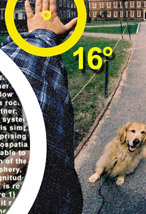 |
 |
| Science and Dyslexia | Contact the LVL | |||||
|
What is Dyslexia? Dyslexia is a hereditary neurological disability marked by difficulties reading or spelling that are surprising given a person's competence in other areas. How Does Dyslexia Affect Abilities for Science? Many highly accomplished scientists perform very well in science despite reading impairments that in some cases are severe. For example, Nobel laureates Baruj Benacerraf and Carol Greider have both accomplished important discoveries in science despite severe impairments for reading. Could People with Dyslexia be Predisposed to Science? The Laboratory for Visual Learning at CfA is investigating a hypothesis that people with dyslexia, because of differences in neurology, may be predisposed to certain forms of visual processing that are useful in science. We are currently carrying out research to test this hypothesis. The Lab for Visual Learning (LVL) To learn more about the LVL, visit our website.
|
Laboratory for Visual Learning Harvard-Smithsonian CfA MS-71 60 Garden Street Cambridge, MA 02138 LVL@cfa.harvard.edu LVL Website: http://www.lvl.si.edu Dr. Matthew H. Schneps LVL Director mschneps@cfa.harvard.edu 617.495.7472 Confidential Email for LVL: CFA.NSF.study@verizon.net | |||||

|
|
